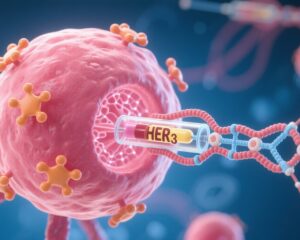Highlight
- YTS109, a CRISPR-engineered hypoimmune allogeneic T cell therapy targeting CD19, was tested in five patients with severe, refractory systemic lupus erythematosus (SLE) complicated by lupus nephritis.
- The therapy demonstrated an excellent safety profile with only mild cytokine release syndrome and no graft-versus-host disease.
- All patients achieved meaningful clinical improvement measured by SLE responder index 4 (SRI-4) at 3 months, with sustained remission to 6 months.
- Renal biopsies revealed significant inflammation resolution and tissue restoration, alongside improved quality-of-life outcomes.
Study Background and Disease Burden
Systemic lupus erythematosus (SLE) is a chronic, multisystem autoimmune disorder characterized by pathogenic autoantibody production and widespread inflammation. Lupus nephritis (LN), a serious manifestation affecting up to 60% of patients, leads to kidney inflammation and damage, significantly increasing morbidity and mortality risk. Current therapeutic regimens include corticosteroids, immunosuppressants, and biologics targeting B cells; however, many patients experience refractory disease or unacceptable side effects.
Autologous CAR-T therapies targeting CD19-expressing B cells have demonstrated promising efficacy in autoimmune diseases by depleting pathogenic B cells. Nevertheless, the need for personalized manufacturing, cost, manufacturing delays, and risks related to random genomic insertion have limited broader application.
To address these hurdles, researchers developed YTS109, an allogeneic, “off-the-shelf” T cell product engineered via CRISPR-Cas9 to knockout immune evasion markers (TRAC, PD1, HLA-A, HLA-B, CIITA) and precisely insert a CD19-targeting synthetic T cell receptor and antigen receptor (STAR) into the TRAC locus. This design aims to preserve physiological TCR-like signaling while minimizing immunogenicity and graft-versus-host disease (GVHD) risk, potentially overcoming autologous CAR-T limitations.
Study Design
This phase 1, multi-disease cohort clinical trial included five adult patients diagnosed with severe, treatment-refractory SLE complicated by biopsy-proven lupus nephritis. Inclusion required failure of at least two immunosuppressive regimens. After lymphodepletion to reduce host immune barriers, each patient received a single infusion of YTS109 at a dose of 3 × 10^6 STAR-positive T cells/kg body weight.
Primary endpoints were safety and achievement of the SLE responder index 4 (SRI-4) response at month 3 post-infusion. Secondary endpoints evaluated clinical remission, reduction in SLE disease activity scores (SLEDAI), renal inflammation by biopsy, and quality-of-life measures using validated instruments through month 6.
Key Findings
YTS109 therapy was well tolerated in all five patients. Adverse events were limited to mild cytokine release syndrome; notably, there were no incidences of graft-versus-host disease or serious infections tied to the treatment.
At 3 months, all patients reached the primary efficacy endpoint with SRI-4 response, which was sustained through month 6. Four patients experienced a rapid and substantial reduction in SLEDAI scores, with mean score decreasing from 31.30 at baseline to 5.35 at 6 months. One patient had a mild flare at 6 months but remained clinically improved compared to baseline.
Renal pathology from follow-up biopsies confirmed marked resolution of inflammatory infiltrates and evidence of tissue remodeling and structural restoration. These findings strongly indicate the ability of YTS109 to reset deleterious autoimmune responses within the kidney.
Patient-reported quality-of-life significantly improved across multiple validated instruments at 6 months, reflecting relief from systemic and renal disease symptoms.
The results suggest that YTS109 can mediate sustained B cell depletion and immune modulation in a manner that restores immune homeostasis, with encouraging durability and tolerability.
Expert Commentary
This pioneering trial establishes the feasibility of using engineered allogeneic T cells with hypoimmune features and precise TCR integration for autoimmune disease targeting. The use of CRISPR/Cas9 editing to knock out alloimmunity and checkpoint molecules, alongside physiological synthetic TCR-like signaling, represents an advance over traditional CAR-T approaches.
By mitigating risks of GVHD and insertional oncogenesis, this platform allows for off-the-shelf availability, potentially expanding access and reducing time to treatment. The dramatic clinical and histopathological improvements observed highlight the critical role of pathogenic B cells in refractory lupus and the transformative potential of targeted cellular immunotherapies.
Nevertheless, this phase 1 study’s small sample size and short follow-up limit generalizability. Longer-term data are needed to confirm durability, relapse rates, and late safety profiles. It remains to be seen how this approach compares with emerging B cell-depleting biologics or other cellular therapies. Additionally, mechanistic studies exploring immune repertoires and function post-therapy will deepen understanding.
Conclusion
The phase 1 trial of YTS109, an allogeneic CD19-targeting engineered T cell product, demonstrates promising safety and efficacy in patients with treatment-refractory SLE complicated by lupus nephritis. The therapy is associated with durable immunologic resetting, clinical remission, renal tissue restoration, and improved quality of life.
These encouraging findings warrant further investigation in larger, controlled trials to validate long-term outcomes and place this novel hypoimmune allogeneic T cell platform’s potential within the evolving therapeutic landscape of systemic autoimmune diseases. If broadly successful, YTS109 and similar products may reshape management of refractory autoimmune conditions through accessible, potent, and durable cellular immunotherapy.
References
1. Wang X, Zhang Y, Wang H, et al. Allogeneic CD19-targeting T cells for treatment-refractory systemic lupus erythematosus: a phase 1 trial. Nat Med. 2025. doi:10.1038/s41591-025-03899-x
2. Kaul A, Gordon C, Crow MK, Touma Z, Urowitz MB, van Vollenhoven R, et al. Systemic lupus erythematosus. Nat Rev Dis Primers. 2016;2:16039.
3. Tsokos GC. Systemic lupus erythematosus. N Engl J Med. 2011 Dec 15;365(22):2110-21.
4. June CH, Sadelain M. Chimeric antigen receptor therapy. N Engl J Med. 2018;379(1):64-73.



